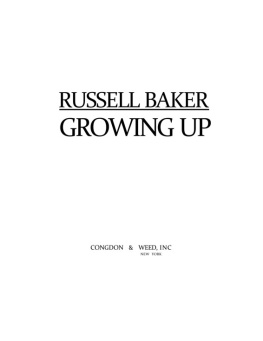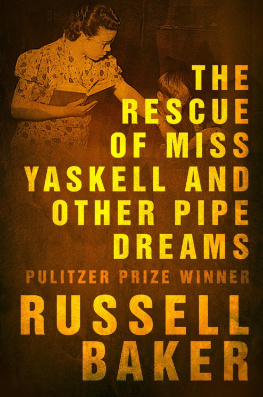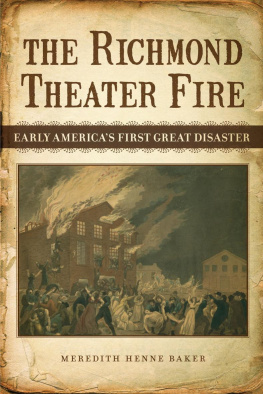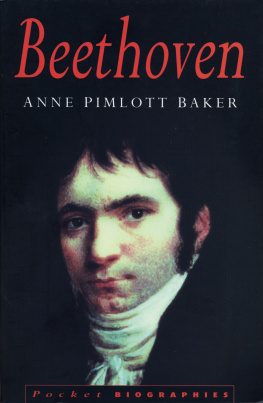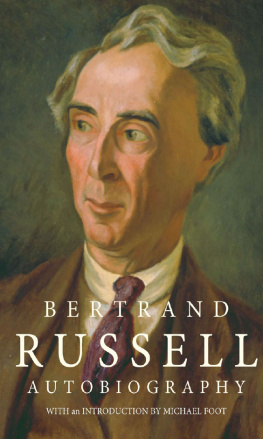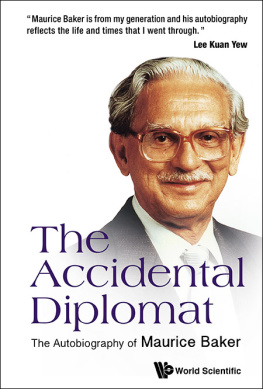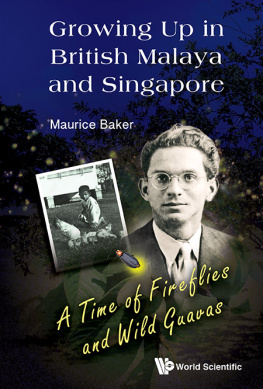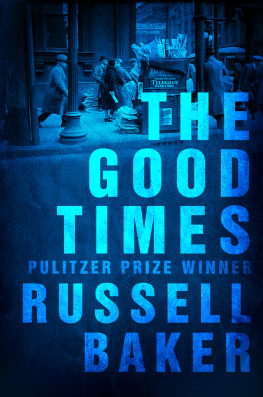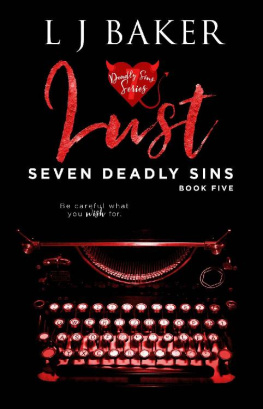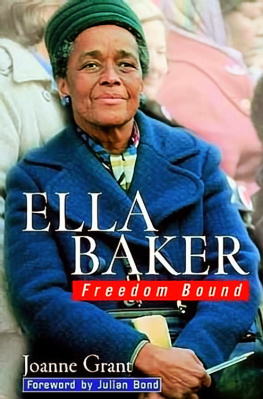RUSSELL BAKER
GROWING UP
CONGDON & WEED, INC
NEW YORK
Copyright 1982 by Russell Baker
Library of Congress Cataloging in Publication Data Baker, Russell, 1925-Growing up.
1. Baker, Russell, 1925- Biography
Youth. 2. Authors, American20th century
Biography. 3. JournalistsUnited States
Biography. I. Title.
PS3552.A4343Z466 1982 o7o'.92'4 [B] 82-12534
ISBN 0-86553-054-8
ISBN 0-312-92267-1 (St. Martin's)
Published by Congdon & Weed, Inc.
298 Fifth Avenue, New York, N.Y. 10001
Distributed by St. Martin's Press
175 Fifth Avenue, New York, N.Y. 10010
Published simultaneously in Canada by Thomas Nelson & Sons Limited 81 Curlew Drive, Don Mills, Ontario M3A 2R1
All Rights Reserved
Printed in the United States of America by The Haddon Craftsmen Designed by Irving Perkins
Seventh Printing
O T H E R B O O K S B Y R U S S E L L B A K E R
Washington: City on the Potomac
An American in Washington
No Cause for Panic
All Things Considered
Our Next President
The Upside-down Man
Poor Russell's Almanac
So This Is Depravity
T o D O R I S
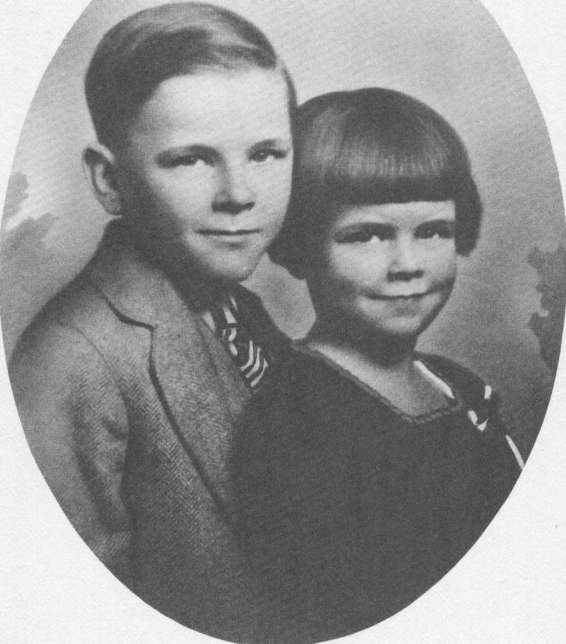
Russell and Doris.
G R O W I N G U P
C H A P T E R O N E
AT the age of eighty my mother had her last bad fall, and after that her mind wandered free through time. Some days she went to weddings and funerals that had taken place half a century earlier. On others she presided over family dinners cooked on Sunday afternoons for children who were now gray with age. Through all this she lay in bed but moved across time, traveling among the dead decades with a speed and ease beyond the gift of physical science.
"Where's Russell?" she asked one day when I came to visit at the nursing home.
"I'm Russell," I said.
She gazed at this improbably overgrown figure out of an inconceivable future and promptly dismissed it.
"Russell's only this big," she said, holding her hand, palm down, two feet from the floor. That day she was a young country wife with chickens in the backyard and a view of hazy blue Virginia mountains behind the apple orchard, and I was a stranger old enough to be her father.
Early one morning she phoned me in New York. "Are you coming to my funeral today?" she asked.
It was an awkward question with which to be awakened.
"What are you talking about, for God's sake?" was the best reply I could manage.
"I'm being buried today," she declared briskly, as though announcing an important social event.
"I'll phone you back," I said and hung up, and when I did phone back she was all right, although she wasn't all right, of course, and we all knew she wasn't.
She had always been a small womanshort, light-boned, delicately structuredbut now, under the white hospital sheet, she was becoming tiny. I thought of a doll with huge, fierce eyes.
There had always been a fierceness in her. It showed in that angry, challenging thrust of the chin when she issued an opinion, and a great one she had always been for issuing opinions.
"I tell people exactly what's on my mind," she had been fond of boasting. "I tell them what I think, whether they like it or not."
Often they had not liked it. She could be sarcastic to people in whom she detected evidence of the ignoramus or the fool.
"It's not always good policy to tell people exactly what's on your mind," I used to caution her.
"If they don't like it, that's too bad," was her customary reply,
"because that's the way I am."
And so she was. A formidable woman. Determined to speak her mind, determined to have her way, determined to bend those who opposed her. In that time when I had known her best, my mother had hurled herself at life with chin thrust forward, eyes blazing, and an energy that made her seem always on the run.
She ran after squawking chickens, an axe in her hand, determined on a beheading that would put dinner in the pot. She ran when she made the beds, ran when she set the table. One Thanks-giving she burned herself badly when, running up from the cellar oven with the ceremonial turkey, she tripped on the stairs and tumbled back down, ending at the bottom in the debris of giblets, hot gravy, and battered turkey. Life was combat, and victory was not to the lazy, the timid, the slugabed, the drugstore cowboy, the 2
libertine, the mushmouth afraid to tell people exactly what was on his mind whether people liked it or not. She ran.
But now the running was over. For a time I could not accept the inevitable. As I sat by her bed, my impulse was to argue her back to reality. On my first visit to the hospital in Baltimore, she asked who I was.
"Russell," I said.
"Russell's way out west," she advised me.
"No, I'm right here."
"Guess where I came from today?" was her response.
"Where?"
"All the way from New Jersey."
"When?"
"Tonight."
"No. You've been in the hospital for three days," I insisted.
"I suggest the thing to do is calm down a little bit," she replied. "Go over to the house and shut the door."
Now she was years deep into the past, living in the neighborhood where she had settled forty years earlier, and she had just been talking with Mrs. Hoffman, a neighbor across the street.
"It's like Mrs. Hoffman said today: The children always wander back to where they come from," she remarked.
"Mrs. Hoffman has been dead for fifteen years."
"Russ got married today," she replied.
"I got married in 1950," I said, which was the fact.
"The house is unlocked," she said.
So it went until a doctor came by to give one of those oral quizzes that medical men apply in such cases. She failed cata-strophically, giving wrong answers or none at all to "What day is this?" "Do you know where you are?" "How old are you?" and so on. Then, a surprise.
"When is your birthday?" he asked.
"November 5, 1897," she said. Correct. Absolutely correct.
"How do you remember that?" the doctor asked.
"Because I was born on Guy Fawkes Day," she said.
"Guy Fawkes?" asked the doctor. "Who is Guy Fawkes?"
She replied with a rhyme I had heard her recite time and again over the years when the subject of her birth date arose:
"Please to remember the Fifth of November, Gunpowder treason and plot.
I see no reason why gunpowder treason
Should ever be forgot."
Then she glared at this young doctor so ill informed about Guy Fawkes' failed scheme to blow King James off his throne with barrels of gunpowder in 1605. She had been a schoolteacher, after all, and knew how to glare at a dolt. "You may know a lot about medicine, but you obviously don't know any history," she said.
Having told him exactly what was on her mind, she left us again.
The doctors diagnosed a hopeless senility. Not unusual, they said. "Hardening of the arteries" was the explanation for laymen.
I thought it was more complicated than that. For ten years or more the ferocity with which she had once attacked life had been turning to a rage against the weakness, the boredom, and the absence of love that too much age had brought her. Now, after the last bad fall, she seemed to have broken chains that imprisoned her in a life she had come to hate and to return to a time inhabited by people who loved her, a time in which she was needed. Gradually I understood. It was the first time in years I had seen her happy.
She had written a letter three years earlier which explained more than "hardening of the arteries." I had gone down from New York to Baltimore, where she lived, for one of my infrequent visits and, afterwards, had written her with some banal advice to look for the silver lining, to count her blessings instead of burdening others with her miseries. I suppose what it really amounted to was a threat that if she was not more cheerful during my visits I would not come to see her very often. Sons are capable of such letters.
Next page
